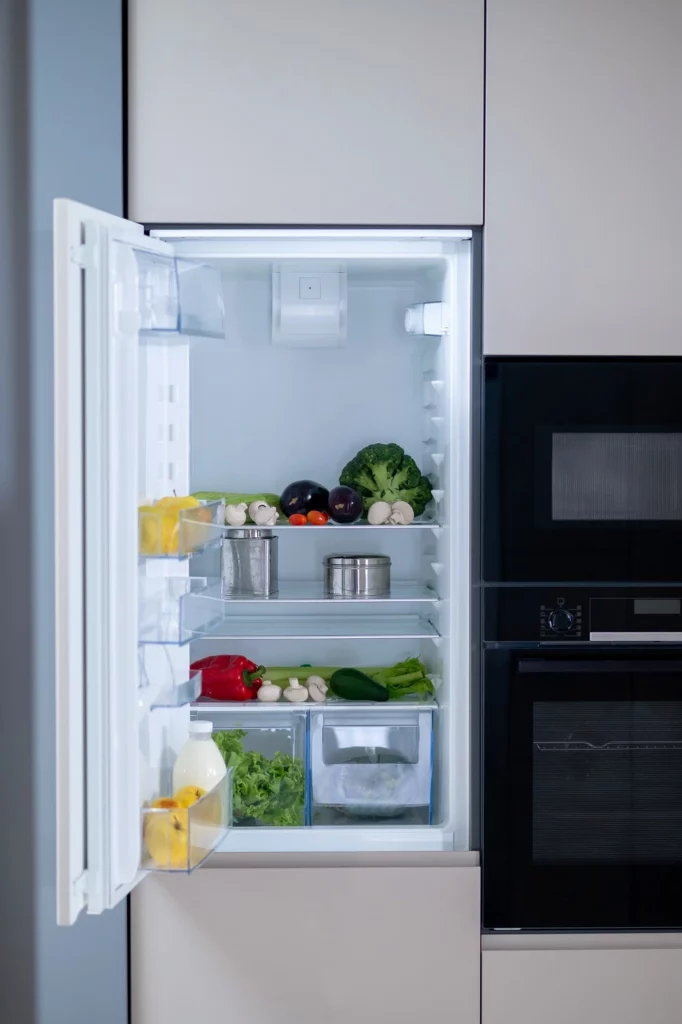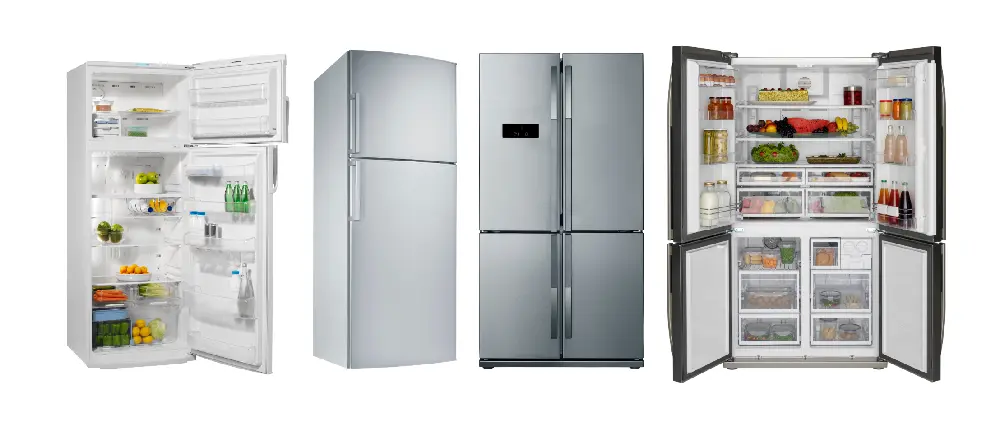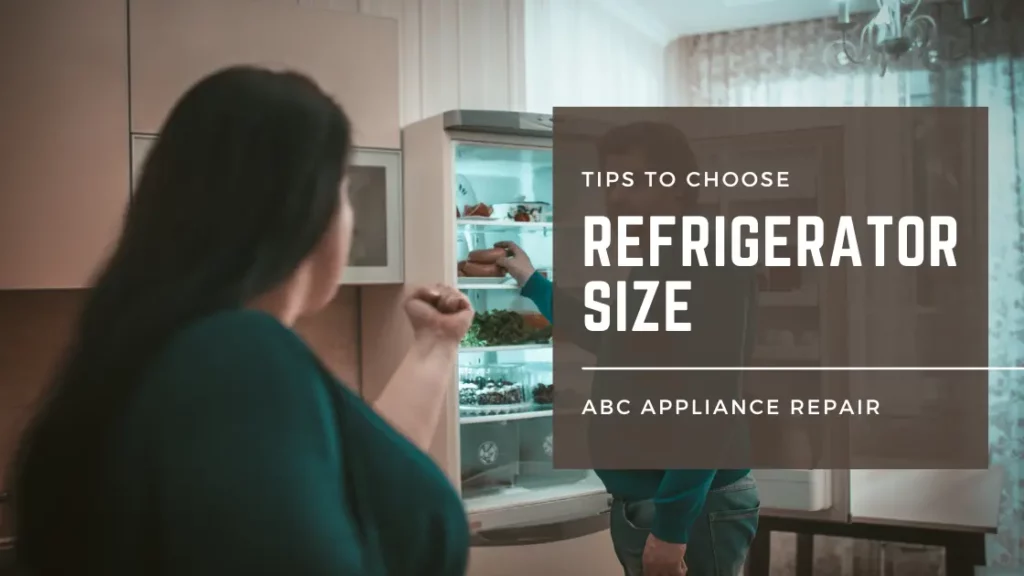Choosing the right refrigerator size is a crucial decision that can significantly impact your daily life. In this comprehensive guide, we will explore the factors to consider when determining the ideal refrigerator size, how to measure available space in your kitchen, and understanding capacity measurements. We will also provide sizing guidelines based on family size and additional considerations to help you make an informed decision. Let’s dive in!
Factors to Consider When Determining Refrigerator Size
When it comes to selecting the perfect refrigerator size, several factors play a vital role:
1. Kitchen Space Availability
To begin, measure the available space for your refrigerator. Take into account clearances needed for efficient operation, ensuring proper ventilation around the fridge.
2. Family Size and Needs
The number of people in your household and their typical food storage requirements based on eating habits are essential factors. Assessing these needs will help you determine the appropriate refrigerator size.
3. Types of Refrigerators Available
Explore different types of refrigerators, such as side-by-side, top-freezer, bottom-freezer, and French-door models. Each type has its benefits and drawbacks concerning size considerations.
4. Measuring Available Space
Follow this step-by-step guide to measure the dimensions of your kitchen space accurately. Proper measurements are crucial for finding a refrigerator that fits seamlessly into your kitchen.
Understanding Capacity Measurements

Learn about the different capacity measurements, such as cubic feet and liters, and how to calculate usable storage space based on these measurements and layout.
Sizing Guidelines Based on Family Size:
1. Assessing Your Family Size
Before diving into various refrigerator sizes, it is essential to assess your family’s needs and habits. Consider the number of people in your household and their eating habits.
- Do you frequently cook at home?
- Do you have kids who require large amounts of food storage?
Understanding these factors will help determine how much space you require within your refrigerator.
2. Compact or Mini Fridges (1-2 People)
For individuals or couples living alone, compact or mini fridges might be suitable options. These refrigerators typically offer around 3-5 cubic feet of storage space. They are ideal for small kitchens, dorm rooms, or as secondary refrigerators for beverages and snacks.
3. Small to Medium-Sized Refrigerators (2-4 People)
For small families or households with 2-4 members, small to medium-sized refrigerators ranging from 10-18 cubic feet could meet most of their storage needs. Such models usually consist of one or two doors and can accommodate standard grocery shopping trips efficiently.
4. Large-Sized Refrigerators (4+ People)
If you have a larger family with four or more members, consider investing in a larger-sized refrigerator for increased storage capacity. Models with capacities ranging from 18-25 cubic feet are suitable for accommodating weekly groceries, meal preps, and bulk purchases.
5. Side-by-Side Refrigerators
Side-by-side refrigerators feature vertical freezer compartments alongside refrigeration compartments that run parallel to each other. These models are known for their spaciousness and organization capabilities. They generally offer around 20-30 cubic feet of storage and are ideal for families seeking balanced freezer and refrigerator space.
6. French Door Refrigerators
French door refrigerators provide versatility and convenience, combining a bottom-mount freezer with two side-by-side refrigerator doors at the top. This design allows easy access to fresh food items while maintaining efficient temperature control. French door models usually range from 20-30 cubic feet, providing ample space for larger families.
7. Top-Freezer Refrigerators
Top-freezer refrigerators, also known as conventional or traditional models, feature a single refrigerator compartment at the bottom and an attached freezer compartment on top. With capacities ranging from 10-25 cubic feet, these models are cost-effective options suitable for small to large-sized families.
8. Considerations Beyond Size
While selecting a refrigerator based on family size is essential, it is equally important to consider various additional factors:
- Energy Efficiency: Look for refrigerators with energy-efficient features such as Energy Star certification to ensure lower electricity bills in the long run.
- Layout and Shelving Options: Assess internal shelving configurations like adjustable shelves or door-in-door compartments that facilitate easy organization and access.
- Freezer Requirements: Evaluate your freezer requirements based on your lifestyle—do you need extra freezer storage or prefer less?
Additional Considerations When Determining Refrigerator Size

In addition to family size, there are other crucial considerations:
- Freezer Capacity Needs: Understand the importance of separate freezer space and estimate the required capacity to meet your family’s frozen food needs.
- Special Storage Requirements: Address niche storage needs, such as bulk item storage or specific food types that require additional space.
- Future Needs: Consider potential changes in your family’s needs over time to ensure your refrigerator remains suitable for years to come.
- Energy Efficiency Considerations: Understand the relationship between refrigerator size, energy usage, and cost implications. Opt for an energy-efficient model to save on electricity bills.
Tips for Optimizing Space in a Small Refrigerator
If you have a small refrigerator, these organization tips and space-saving accessories will help you maximize storage efficiency.
- Clever Organization Tips: Utilize stackable containers, label items, and prioritize based on frequency of use to create a well-organized fridge.
- Space-Saving Accessories and Tools: Invest in drawer organizers, door shelves, and refrigerator bins to make the most of every inch of your limited space.
Choosing the Best Refrigerator Style for Your Family
While selecting the right sized refrigerator may require a few simple measurements, maintaining its optimal performance over an extended period is not so straightforward. To ensure that both your refrigerator and other major appliances continue to operate efficiently, reach out to the appliance experts at ABC Appliance Repair. With our extensive knowledge and experience, we can promptly diagnose and resolve most issues on the same day. We service all major makes and models and offer refrigerator maintenance plans as well as convenient appointment scheduling. Contact us today by phone or online to learn more!
Conclusion
Selecting the right refrigerator size is critical for a well-functioning kitchen and daily convenience. By considering kitchen space availability, family size and needs, and understanding capacity measurements, you can make an informed decision. Additionally, take into account freezer capacity needs, special storage requirements, and future needs to ensure the refrigerator accommodates your changing lifestyle. Finally, prioritizing energy efficiency will not only save you money but also contribute to a greener environment.
Frequently Asked Questions
To measure available space, use a tape measure to note the height, width, and depth of the area where the refrigerator will be placed.
Cubic feet and liters are different units used to measure the storage capacity of refrigerators. Cubic feet is the standard measurement in the United States, while liters are more commonly used internationally.
Yes, you can store bulk items in a standard-sized refrigerator by utilizing clever organization techniques and space-saving accessories.
Defrosting your freezer every 3 to 6 months, or when the ice buildup reaches 0.25 inches (0.6 cm) will help maintain its efficiency.
French-door refrigerators are generally more energy-efficient compared to side-by-side models due to their design and compartmentalization of cold air. However, specific models and features will influence energy efficiency, so always check the energy label.







